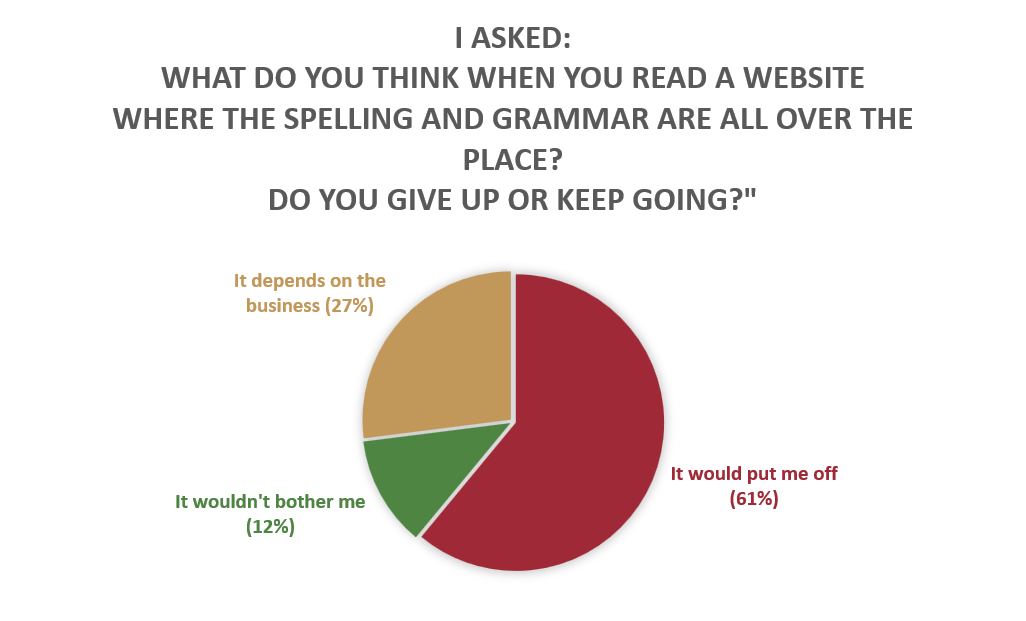Some time ago, I asked the members of a Facebook networking group for businesswomen* what they thought when encountering poor spelling and grammar, for example on a website.
A lively discussion ensued, The 26 different opinions fell broadly into 3 categories:
61% said: It would put me off
12% said: It wouldn’t bother me
27% said: It depends on the type of business hosting the website.
Let’s look at some of the comments in a bit more detail:
It would put me off
Comments under this category expressed a range of reactions, from mild annoyance to giving up on the site.
- “If I came across a website littered with errors I’d go elsewhere. “It suggests a lack of effort/intention and attention to detail.”
- “I stop reading and leave the site.”
- “Readers should not have to work at understanding what you mean.”
- “If you want to be taken seriously you need to get it right.”
It wouldn’t bother me
- “It’s not about their spelling and grammar it’s about who they are and how they show up.”
- “You hire people based on the results they can deliver, not because their website is impeccable with no spelling mistakes.”
Another commenter had made a conscious effort to be less bothered about this in recent years.
It depends…
The opinions expressed here related to context: a person who deals in detail in their work should expect to be held to a higher standard of writing than someone whose role is a world away from words.
- “If I am not paying people to spell I don’t really mind.”
- “If it was a law firm or an accountancy, I would be more critical as the skills required for such professions are detail orientated.”
- “If it is a creative I do not much care.”
What else did people say?
All sorts of things! It became a very emotive conversation.
A consensus began to form that it’s important to get fresh eyes on your site, whoever you are and whatever your skill level in this area.
After all, it’s really hard for anyone, even proofreaders, to proofread their own work, because we see what we think is there, rather than what actually is there.
“If I was just going on a Google search to find a service, and knew nothing about them I would move on, because it looks so unprofessional.”
Why jeopardise your chance of a sale?
At the very least, you should use the spell checker feature, although it’s worth remembering that it won’t catch everything.
“The issue for me isn’t that a person cannot spell, it is the fact that it hasn’t been checked. As a business owner you would need to have a professional looking presence.”
What should you do to avoid losing a potential customer?
My very unofficial survey sought opinions from only a small number of people. However, I hope I’ve convinced you not to run the risk of encouraging any potential customer to leave your site before they’ve found out more, contacted you or even made a purchase.
“It certainly discourages me from using their services.”
At the very least, use a spell check and ask a friend to check your site. Or hire a professional proofreader.
So… do spelling and grammar really matter? Yes, they do.
I can help
If you’re a business owner and want to make sure your website provides the right first impression, I offer website proofreading starting from only £60 (currently £48 in my launch offer). Find out more here.
* Female Networking Association – Community for Female Business Owners. Before the group was archived in February 2021, it had 4,000 members. I asked my question on 2 August 2020. I would like to thank everyone who got stuck into the debate, and hope they don’t mind their uncredited words featuring here.


Recent Comments